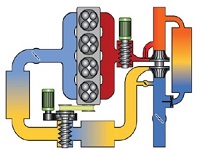Enhanced Engine Improvements

Technology Description:
The University of Michigan team will develop a compact micro-hybrid configuration that pairs an Electrically Assisted Variable Speed (EAVS) supercharger with an exhaust expander Waste Energy Recovery (WER) system. Together, the EAVS and WER can nearly eliminate the slow air-path dynamics associated with turbocharge inertia and high exhaust gas recirculation (EGR). The EAVS system compresses engine intake air to increase engine power and allows the engine to have valuable “breathing time.” This breathing time allows for a coordinated intake boosting and exhaust vacuum, so that the combustion timing and fueling is always optimal. Meanwhile, the WER system will capture exhaust energy, store it in a low-voltage battery together with energy from regenerative braking and later reuse it to assist the engine under transient acceleration loads, helping to further increase fuel efficiency. The team’s innovation could increase fuel economy in advanced vehicles by 20%.
Potential Impact:
If successful, the University of Michigan project team will improve fuel economy in vehicles by 20% at a much lower cost than alternative engine technologies.
